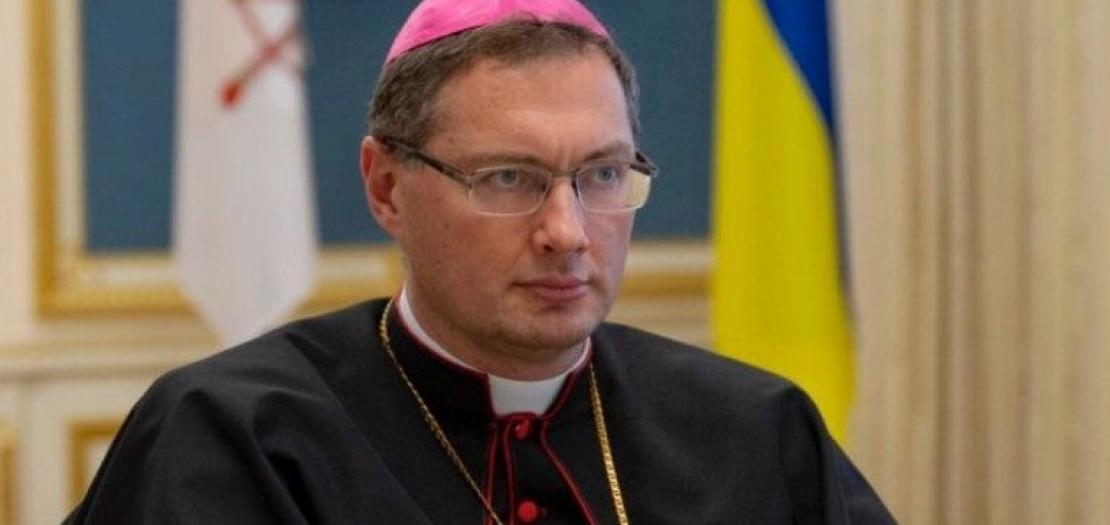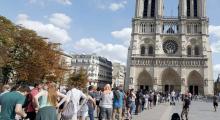Issued by the Catholic Center for Studies and Media - Jordan. Editor-in-chief Fr. Rif'at Bader - موقع أبونا abouna.org
By Svitlana Dukhovych

Apostolic Nuncio to Ukraine Archbishop Visvaldas Kulbokas,
Archbishop Visvaldas Kulbokas, Apostolic Nuncio to Ukraine, has echoed Pope Leo XIV’s appeal at the Wednesday General Audience, emphasizing the need for a conversion of hearts, and pointing out that the exchange of prisoners shows that “even if political issues remain unresolved, dialogue is at least useful from a humanitarian standpoint.”
Toward the conclusion of the General Audience with the faithful in St. Peter's Square, Pope Leo appealed to all faithful to pray for peace in Ukraine, that the war may end, calling for international support for efforts toward dialogue.
The Holy Father had said his thoughts "often turn to the Ukrainian people affected by new serious attacks against civilians and infrastructure,” brutal assaults that, as confirmed by the Nuncio in the following interview, have increased over time.
Q: Your Excellency, after Pope Leo's appeal for Ukraine at the General Audience, what would you like to say?
The words of Pope Leo XIV about the attacks on Ukrainian cities and infrastructure, and his invitation to pray for peace, are very important. I would especially highlight that last aspect: praying for peace. Because the context is such that we are in the fourth year of the war, attacks against cities and civilian infrastructure are not decreasing, but increasing.
Recently, we have even witnessed in the capital, Kyiv, continuous bombings every day, every night. No army in the world would be able to defend itself from such intense attacks. Faced with this reality—where no one is able to fully protect life, cities, or infrastructure—the Pope’s appeal is to pray for peace.
We are still in the month of May, the month dedicated to the Rosary. I always recall the words of the Virgin Mary at Fatima: 'Pray, pray, pray. Through prayer you will overcome destruction and war and obtain the conversion of hearts.'
Therefore, it is practically the only weapon we have, as Church and as humanity. I am personally very grateful to the Holy Father for this appeal.
Q: There has recently been the largest prisoner exchange between Ukraine and Russia since the beginning of the war. We know the Holy See cares deeply about the issue of prisoners. What would you say about this exchange?
Yes, from one side, as the Nunciature, we are contacted multiple times a day by families or associations of families seeking help in finding their loved ones who are missing or imprisoned, many of whom are civilians.
The exchange that took place was very significant because it involved 1,000 prisoners on each side. It truly is a joy for those who were able to return home—a great joy.
We know that this was the result, perhaps the only result, of the talks that took place in Istanbul on May 16. So even though political issues were not resolved, the dialogue served at least on a humanitarian level. This is a very good outcome.
Certainly, the greatest difficulty concerns civilians and the children because there is almost no possibility for exchange. What exchange [could be carried out, ed.]? What can Ukraine offer in return?
Therefore, often, paradoxically, it is easier to exchange military prisoners of war because Ukraine can offer something in return. This is not the case for civilians.
Thus, we need to intensify both our prayer and our efforts. The only issue is that it’s difficult to see clearly in which direction we should focus our energy because we seem to be in a dead end.
Some of the prisoners exchanged were civilians. I was happy to see that aspect. However, in Ukraine, the number of [Russian, ed.] civilians remaining is very limited—not even remotely comparable to the number of [Ukrainian, ed.] civilians held on the other side.







